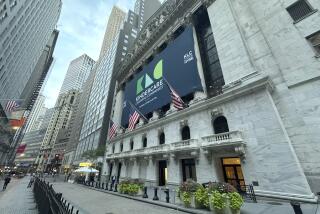Wall Street’s woes invite foreign cash
- Share via
The Chinese government’s decision to pump $5 billion into Morgan Stanley is the latest sign of foreign investors’ growing interest in U.S. financial firms that have been battered by the sub-prime mortgage crisis.
For its money, China Investment Corp. will earn 9% a year on its investment until it converts into as much as 9.9% of Morgan Stanley’s common shares in 2010, making the so-called sovereign wealth fund the second-largest shareholder in Wall Street’s No. 2 investment bank.
The move follows similar investments by another Chinese group in Bear Stearns Cos. in October and by Abu Dhabi in Citigroup Inc. last month. In May, China Investment acquired a stake in Blackstone Group as the private equity giant went public.
Cash from abroad has come as financial firms strive to cope with massive losses on mortgage-related holdings. Morgan on Wednesday reported the first quarterly net deficit in its 73-year history after incurring $9.4 billion in losses tied to mortgage securities, almost triple what the firm forecast in November.
Treasury Secretary Henry M. Paulson Jr. said Wednesday it was a good sign that major U.S. financial companies were raising fresh capital after being pummeled by mortgage losses.
“Our institutions came into this well-capitalized, and it’s important that they stay that way,” he said in an interview with Times reporters and editors in Los Angeles.
Paulson wouldn’t comment directly on China’s recent Wall Street dealings, but said: “Foreign investment is the ultimate vote of confidence in our economy.”
Investors apparently agreed. Morgan Stanley’s stock jumped 4.2% on the news, adding $2.01 to $50.08.
Not everyone had such a positive view of the pact. Sen. Christopher J. Dodd (D-Conn.), chairman of the Senate Banking Committee, said he wanted “to know more about the specifics of this deal,” including whether it needed to be reviewed by federal regulators.
One analyst said the infusions from abroad were an indicator of America’s eroding position in global capital markets.
“What you’re seeing is a shift in financial power away from the United States to China and the Middle East,” said Richard X. Bove, an analyst at Punk Ziegel & Co., “and that is not good for the U.S. economy.”
Among other things, Bove said, Wall Street’s loss of financial clout could put U.S. companies at a disadvantage when competing with foreign rivals for funding.
Morgan Stanley’s fiscal fourth-quarter loss of $3.59 billion, or $3.61 a share, was much worse than the 39-cent-a-share loss estimated on average by Wall Street analysts. In the fourth quarter of 2006, Morgan Stanley reported a profit of $2.21 billion, or 2.08 a share.
Chief Executive John Mack called the results disappointing. The firm said it was reorganizing trading operations to better manage and monitor risk. “It’s clear that there is something very wrong in the management structure of this company,” Bove said.
U.S. and foreign investment firms racked up tens of billions of dollars in losses in recent months as increasing numbers of sub-prime borrowers defaulted on their loans, rocking the housing industry and causing a credit crunch that is threatening the health of the American economy.
It also cost several Wall Street executives their jobs, most notably the CEOs of Citigroup and Merrill Lynch & Co. Mack, who pushed Morgan Stanley into mortgage lending over the last year, said Wednesday he would forgo his annual bonus, which was $40 million last year.
Although Morgan Stanley and other firms have been aggressively marking down the value of mortgage-related securities on their books, analysts said the sub-prime crisis wasn’t over.
“I don’t think we’re seeing the light at the end of the tunnel,” said Matthew Albrecht, an equity analyst with Standard & Poor’s in New York. “I think there is more to come in the first two quarters of 2008. If it will be as severe as it’s been is hard to tell.”
Jeffrey Gundlach, who oversees $150 billion in assets as chief investment officer at TCW Group Inc. in Los Angeles, said he believed that the cash infusions to major financial companies were setting the scene for a rebound by their beaten-down stocks next year.
“We’ve entered the recapitalization phase,” he said in a conference call with investors Wednesday. “That’s the workout phase for these problems.”
Although Gundlach said it was time to begin thinking about buying the stocks, he added: “I don’t think there’s any hurry.”
--
--
Times staff writer Tom Petruno contributed to this report.
--
(BEGIN TEXT OF INFOBOX)
At a glance
Sovereign wealth funds have become an important -- and highly secretive -- source of global investment in recent years. Here are some key facts about them:
The funds are government-owned investment pools holding financial assets such as stocks and bonds.
There are an estimated 20 sovereign wealth funds in the world with total assets estimated at $2 trillion to $3 trillion.
The largest sovereign funds are believed to be owned by China, Russia, Abu Dhabi, Norway, Singapore and Kuwait.
The assets of sovereign funds have ballooned in recent years. Oil revenue has boosted funds in Russia and the Middle East. China’s trade surplus with the United States has fed Beijing’s hoard.
The funds don’t publicly report their holdings. In the past, they were believed to be dominated by conservative assets such as U.S. Treasury securities. In recent years, the funds have increasingly bought stakes in foreign firms, such as China Investment Corp.’s deal for part of Morgan Stanley, announced Wednesday.
Source: Times research
More to Read
Inside the business of entertainment
The Wide Shot brings you news, analysis and insights on everything from streaming wars to production — and what it all means for the future.
You may occasionally receive promotional content from the Los Angeles Times.










